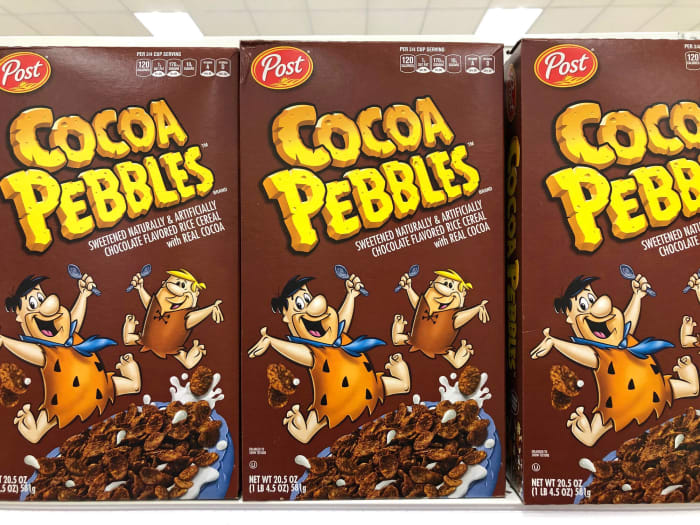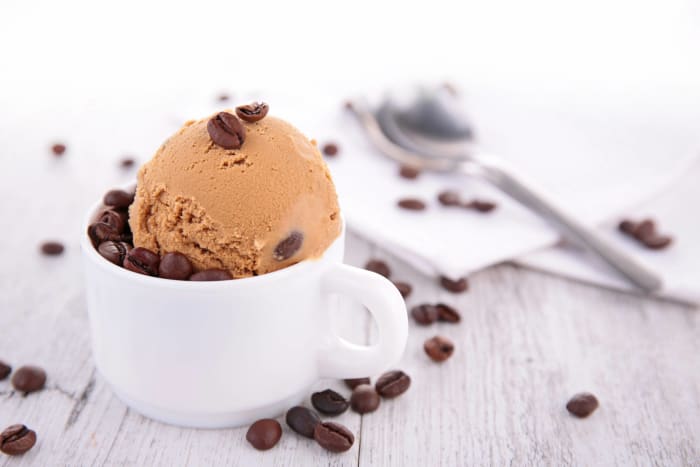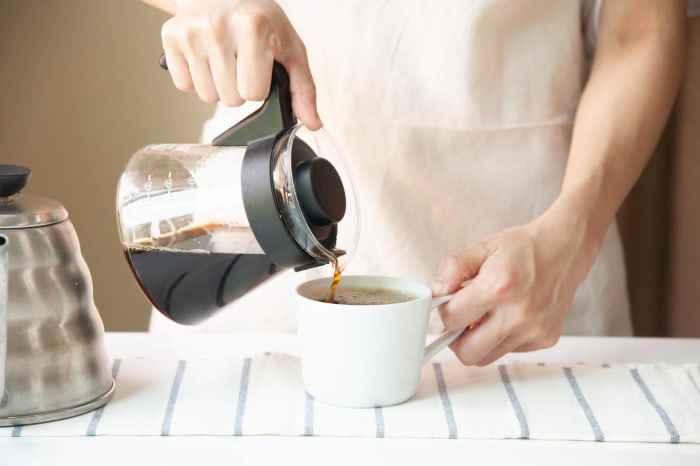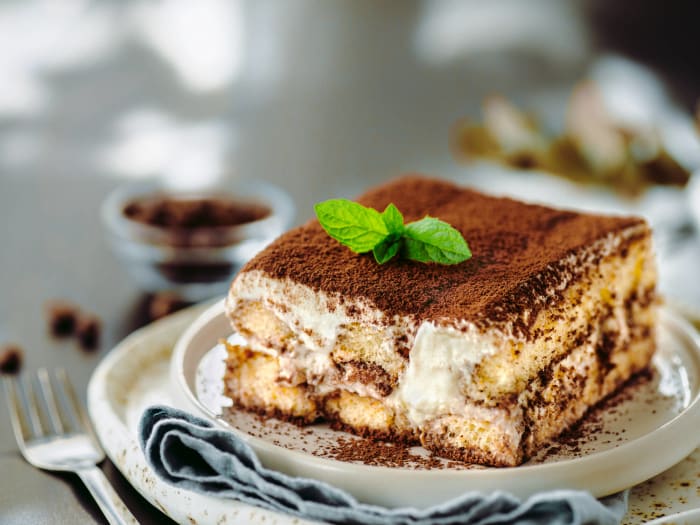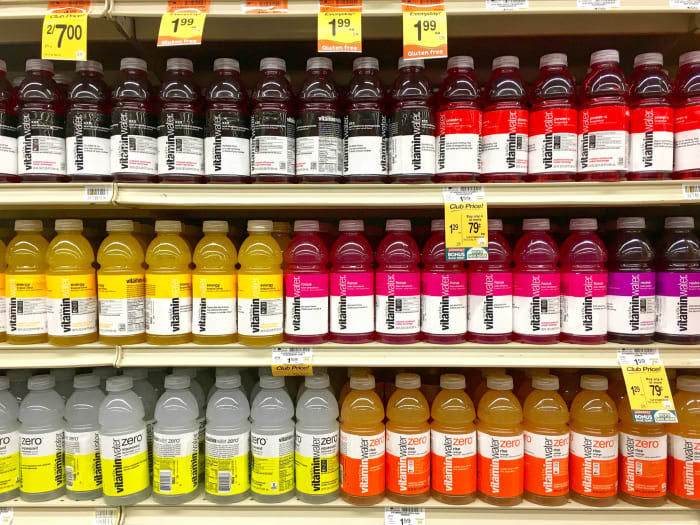Coffee and energy drinks are the obvious sources of caffeine, but this stimulating substance also appears naturally in other food & drink (including some supplements and medications). Although some items are sneakily high in caffeine, most contain a negligible amount compared to the average cup of coffee, which has about 10 mg per ounce. Whether you’re trying to avoid caffeine completely or looking for a little pick-me-up, here are 23 foods and drinks that surprisingly contain caffeine.
iravgustin / Shutterstock.com
This is probably one of the more obvious ones on the list, as many people already know chocolate contains caffeine. How much, though? One ounce of dark chocolate has about 12 mg of caffeine, while the same serving of milk chocolate has about 6 mg. Not everything that tastes like chocolate has caffeine in it—some products use artificial flavoring—so we’ll address some other chocolate-related sources later in this slideshow.
ZikG / Shutterstock.com
CLIF Bars are advertised as giving you the energy to fuel your active adventures via calories, carbs, and protein, but you might be surprised to find out there’s another source of pep: caffeine. Green tea extract is the reason for it, and this ingredient is included in Cool Mint Chocolate (49 mg), Peanut Toffee Buzz (44 mg), Caramel Macchiato (65 mg), Espresso Mini (65 mg), and Cappuccino Mini (65 mg). Of course, flavors containing chocolate also have trace amounts of caffeine.
Sheila Fitzgerald / Shutterstock.com
This one is a bit surprising, as Cocoa Pebbles is a kid’s cereal, but don’t worry because the amount of caffeine is negligible. Every cup of Cocoa Pebbles has about 1 mg of caffeine, meaning even if you ate the entire box, you wouldn’t notice the effects. (We’d be more concerned about the amount of sugar!)
margouillat photo / Shutterstock.com
Be careful with the coffee ice cream! Having this treat for dessert can compromise your sleep quality, as half of a small container of Häagen-Dazs' coffee ice cream contains about 43 mg of caffeine. That’s like drinking half a cup of coffee!
dmnapat / Shutterstock.com
Yes, even decaf coffee contains a bit of caffeine. Depending on the variety, a 16-ounce serving of Joe could contain as much as 14 mg of caffeine, so be sure only to have one or two cups if you’re caffeine-averse.
5 second Studio / Shutterstock.com
Some people assume green tea is caffeine-free, like herbal tea, but that’s not the case. (We hinted at this earlier when talking about green tea extract in CLIF Bars.) An 8-ounce cup of green tea actually contains around 30 mg of caffeine.
7 of 23
Green tea ice cream
Anna_Pustynnikova / Shutterstock.com
If you know that green tea contains caffeine, you’d probably assume green tea ice cream would contain a little bit, if any. As it turns out, green tea ice cream can contain even more caffeine than the typical tea, as a more concentrated version of green tea is used to achieve flavor and color. In fact, a ½-cup serving of Häagen-Dazs green tea ice cream can contain 25 mg of caffeine—that’s more caffeine per serving than some coffee ice cream!
George Dolgikh / Shutterstock.com
If you’re not a frequent caffeine consumer, you might be surprised to find out that some types of gum contain caffeine. We’re not talking about Trident or Orbit or another major brand, but instead, one of the dozens of caffeine-infused varieties specially made to give the chewer an energy boost. This includes brands like Jolt, Run Gum, MEG, Rev, and Alert.
Nor Gal / Shutterstock.com
When warming up in winter weather, some people eschew coffee in the evening in favor of a non-caffeinated beverage: hot chocolate. But hold on, as the average hot cocoa actually contains about 5-10 mg of caffeine, so don’t go overboard!
gowithstock / Shutterstock.com
Most iced tea, like hot tea, contains caffeine. However, the addition of ice keeps the caffeine content of iced tea lower by volume than hot tea. So while a typical 8-ounce tea has about 40 mg of caffeine, adding a lot of ice could cut that in half. Buying a canned or bottled variety could yield even less caffeine, as even a 20-ounce bottle of Lipton Iced Tea only contains 25 mg.
Agarianna76 / Shutterstock.com
The kola nut is a popular snack originating in West Africa, but its most common use is as an extract. The similarity in sound and spelling to “cola” is no coincidence, as the nut used to be an ingredient in colas and other sodas, providing them with a boost of caffeine. The kola nut itself is positively packed with caffeine, as each pod contains the equivalent of two cups of coffee!
zarzamora / Shutterstock.com
Kombucha is made from tea, so it naturally contains some caffeine. Some estimates say kombucha has about one-third of the caffeine content of its source tea—be it black, white, oolong, etc. On average, you should expect an 8-ounce serving of kombucha to include about 10-15 mg.
Africa Studio / Shutterstock.com
Matcha has been rising in popularity in recent years, but some folks don’t know it contains caffeine because they’re not sure precisely what matcha is. Matcha is a powder made from a variety of ground green tea leaves that actually contain more caffeine than the average green tea. The matcha is then used to make tea or another beverage or as a flavor or dye. One teaspoon of matcha—a typical serving size—has about 70 mg of caffeine.
Mehaniq / Shutterstock.com
Nutella is billed as a hazelnut spread, but let’s be real: we’re all in it for the chocolate. But the inclusion of cocoa powder means Nutella has a bit of caffeine in it, with a 2-tbsp serving totaling about 3 mg.
Pao Laroid / Shutterstock.com
It’s a small amount, but we were honestly surprised to find out that Oreos contain any caffeine at all. Each Oreo has about 1.3 mg per cookie, so if you eat an entire package, you can expect a boost of energy. But brace yourself because the amount of sugar in Oreos will indeed cause you to crash soon afterward!
16 of 23
OTC pain relievers
EditheVideo / Shutterstock.com
Most people know Excedrin contains a combination of caffeine, acetaminophen, and aspirin, but they might not be aware of a few additional pain relievers that also include the stimulant. Other options include Bayer Back & Body, Alka-Seltzer XS, and Sudafed Sinus Max Strength.
ZikG / Shutterstock.com
Caffeine is generally not recommended during menstruation, as it can exacerbate PMS symptoms by constricting blood vessels and causing inflammation and bloating. Yet some PMS medications actually include caffeine! Midol, for instance, contains 60 mg of caffeine per dose as a diuretic. Check the label and look for caffeine-free options.
Aleksey Korchemkin / Shutterstock.com
Protein powders come in a lot of varieties, including some that taste like coffee. However, it’s not just a flavor in some cases—they actually contain coffee and caffeine. This includes Muscle Milk’s Mocha Latte and Cafe Latte, Dymatize’s Dunkin’ Cafe Mocha and Dunkin’ Cappuccino, and ISOPURE’s Coffee flavor.
Lana Langlois / Shutterstock.com
Even your favorite — or your kids’ favorite — chocolate pudding can covertly contain some caffeine. According to the U.S. Department of Agriculture (USDA), a snack-size serving of chocolate pudding (about 4 oz.) has more than 2 mg of caffeine.
The Image Party / Shutterstock.com
Sure, sodas like Pepsi, Coke, and Mountain Dew contain caffeine, but do any others? Yep! Dr. Pepper, Moxie, Sunkist, Barq’s, and a few others are all on the list, with each 12-ounce soda containing anywhere between 20 and 60 mg of caffeine. The caffeine-free options include Sprite, Sierra Mist, 7-Up, and most ginger ales.
Fascinadora / Shutterstock.com
Tiramisu is made of ladyfingers that are dipped in espresso and layered with cocoa powder, among other ingredients. That espresso and chocolate combination is a double-whammy of caffeine that adds up to about 25-30 mg in an average piece.
Sheila Fitzgerald / Shutterstock.com
Vitamin Water has always had a multitude of flavors boasting all kinds of benefits, from vitamins and minerals to electrolytes and antioxidants. But choose wisely the next time you’re browsing the Vitamin Water section, as one flavor, “Energy Tropical Citrus,” also contains 60 mg of caffeine!
yanik88 / Shutterstock.com
In society’s never-ending quest to add caffeine to every product possible, there are even bottled waters now that contain caffeine. Of course, to some people, this can be an advantage — after all, water is much healthier than coffee, soda, or energy drinks. But other people might not be expecting to find caffeine in their water, so it’s important to always read labels, especially for anything labeled as “energy water.”
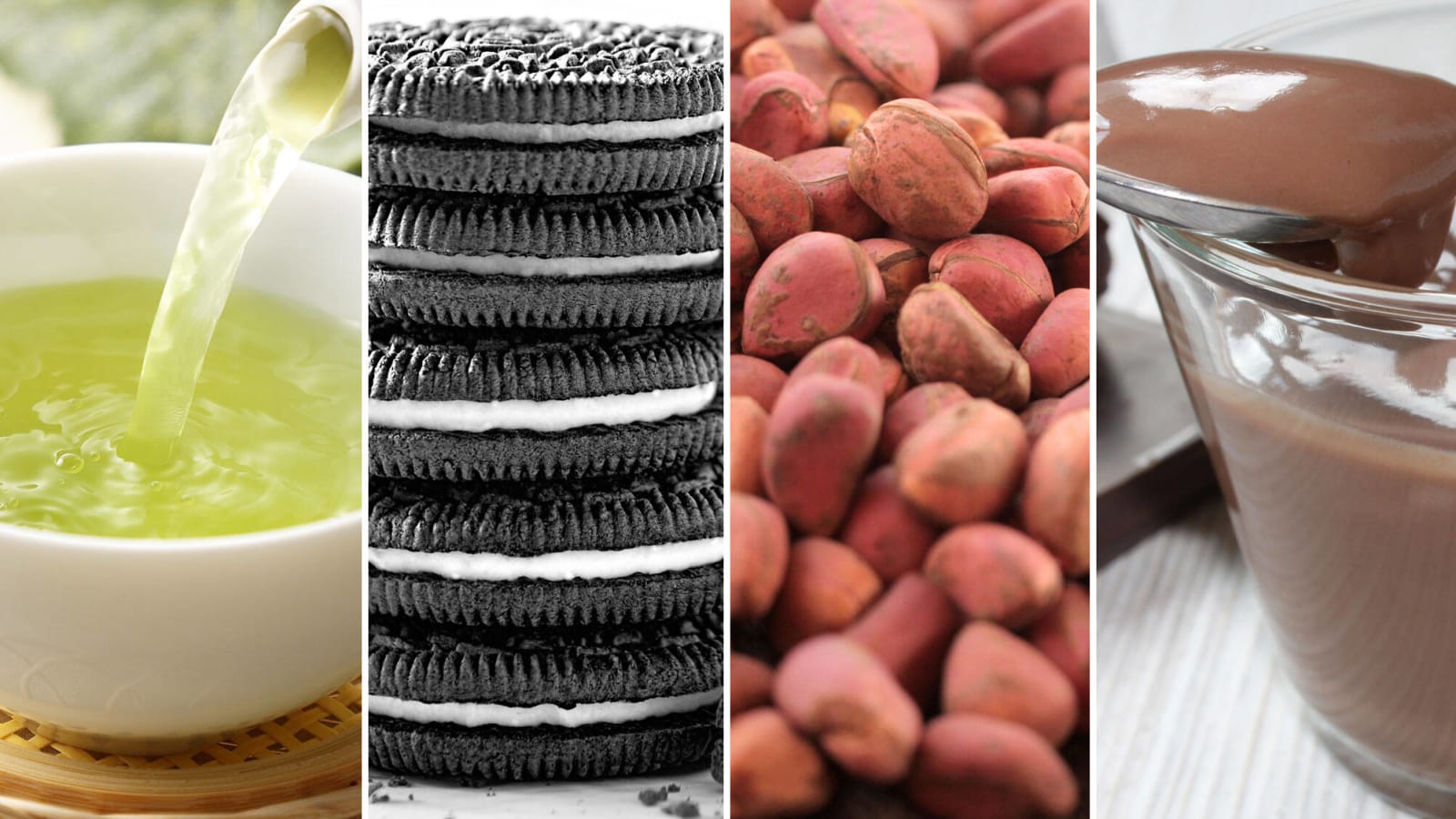
 +
+


